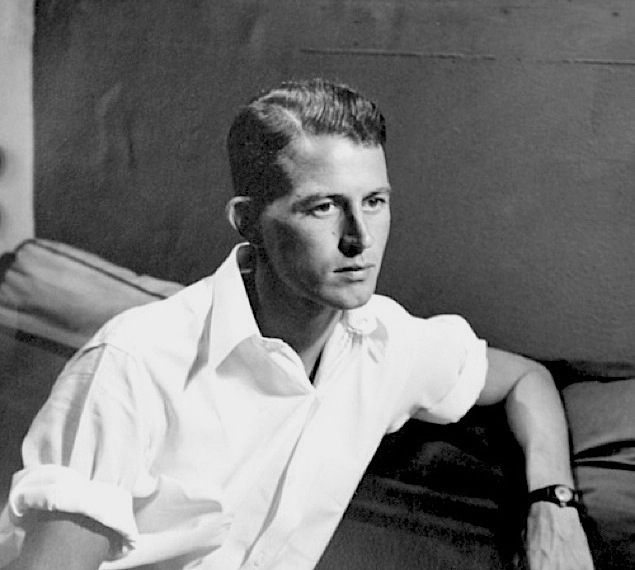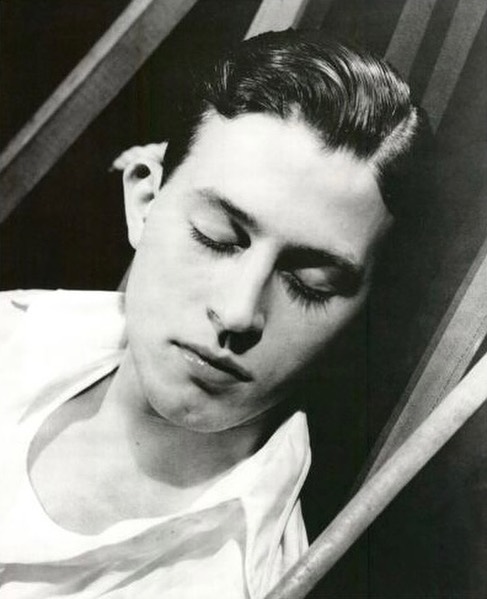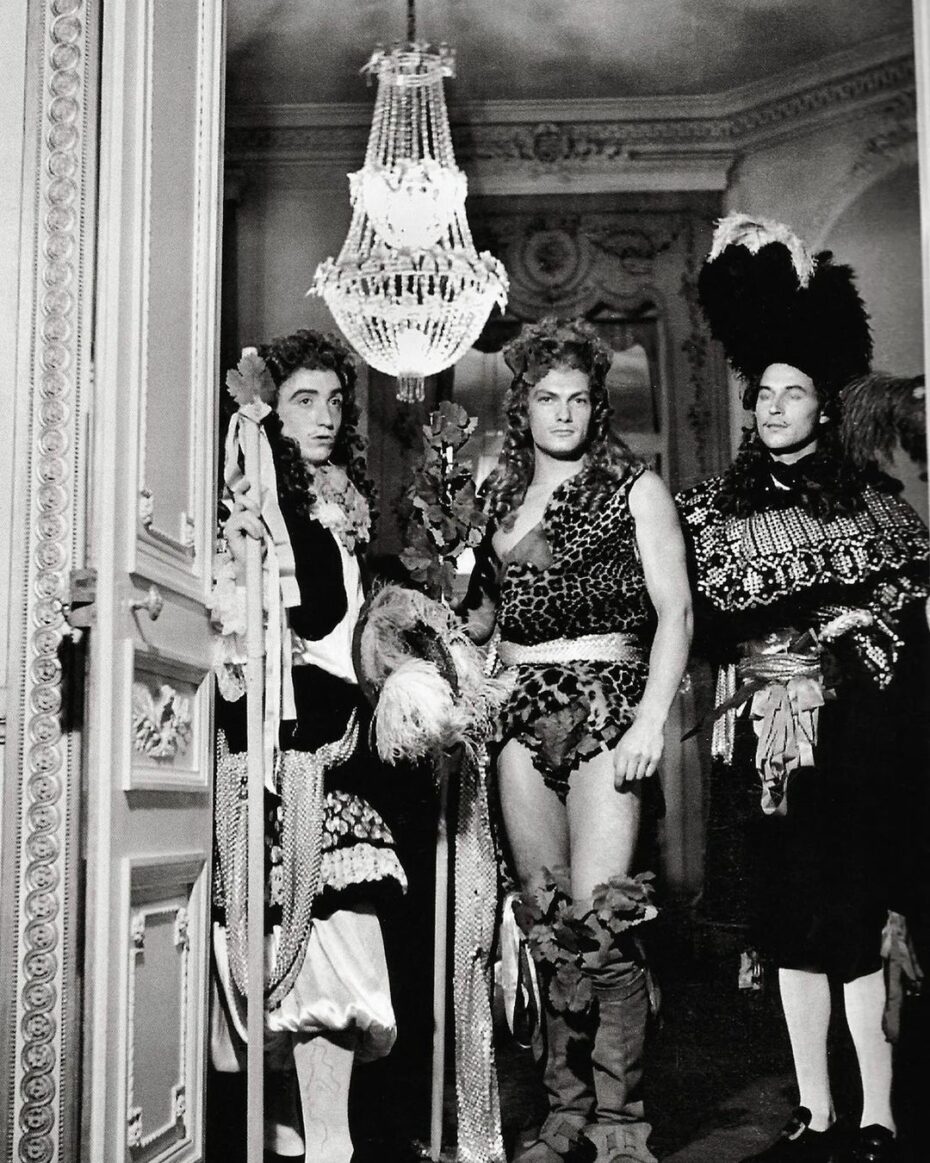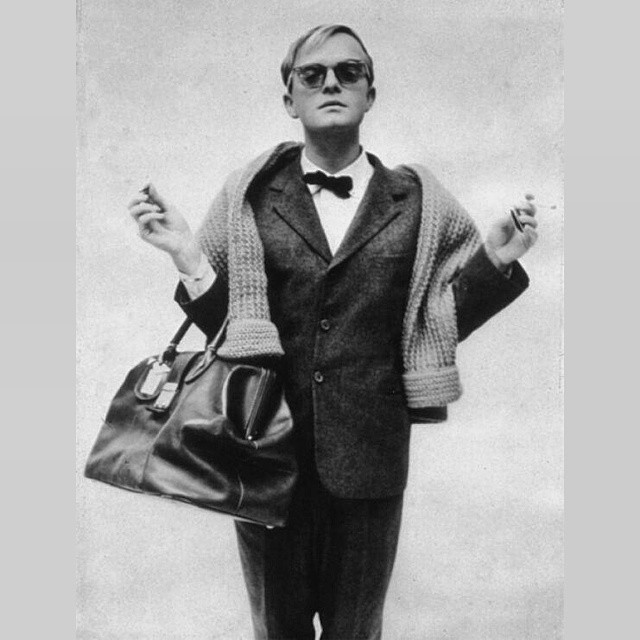
Whatever that intangible ‘It’ factor is, the gods bestowed it on Denham ‘Denny’ Fouts in disproportionate quantities. He was blessed with more natural-born charisma than Leonardo Di Caprio, Brad Pitt and The Talented Mr Ripley put together. Denny Fouts exuded a carnal mojo of the kind that compelled a Greek king, German baron and a British viscount to pursue him to the ends of the earth. To boot, he was streetwise and intelligent. That he was ridiculously good-looking perhaps also needs to be said, and also that his ‘pulling’ prowess was without peer: he could literally snag and bag any celebrity he set his sights on. Once he had homed in on them, moths to a flame they were, putty in the hands of the irresistible Denny Fouts. Added to this fool-proof arsenal of looks and personality was a cocky and cavalier attitude: who in their right mind have the nerve to send a blank cheque to writer-god Truman Capote, summonsing him with a one-word edict, “come”? This happened in Paris shortly after WW2 and was triggered by Fouts spotting an image of Truman Capote on the dust jacket of Other Voices, Other Rooms. Capote ignored the money but couldn’t resist the call, and ended up listening to the stories of the “best-kept boy in the world” for hours on end in a dark apartment on the Rue du Bac. In fact, so mesmerised was Capote with Fouts’ spellbinding antics, he famously claimed that “had Denham Fouts yielded to Hitler’s advances there would have been no World War Two.”

Denny Fouts’ flame shone brightly, and momentarily illuminated everyone in his orbit, but burnt out in his prime. Born Louis Denham Fouts in 1914 in the Deep South of Jacksonville, Florida, he died young, at age 34, on December 16, 1948 in Rome. His bizarre antics (he once shot flaming arrows from his hotel room onto the bustling Champs Élysées) and his self-destructive heroin addiction were out of control, but all of it further bolstered the mythical figure that was Denny Fouts. At age 12, he already showed a confidence and assertiveness way beyond his years when he wrote to Time Magazine protesting the use of animals in films. His father was a Yale graduate from a humble middle-class family, the president of a broom factory; Denny would eventually follow in his father’s academic footsteps and study medicine at UCLA. But that’s after many meanderings through the world of lowly employment, serving amongst others as a clerk in an ice cream factory and stock boy in a grocery store after having been expelled from school. All the while, Denny Fouts clocked that all these back roads would eventually lead him to the ultimate fertile hunting ground, where famous aristocrats, writers, poets, painters and other creatives roamed. And almost without exception they fell lock, stock and barrel for the charm of the most exclusive, most expensive and most coveted ‘kept boy’ in the world.

Denny Fouts realised at a young age the power of his personality and looks, and took full advantage. It didn’t really matter where in the world he found himself, others found him irresistible. Novelist Christopher Isherwood described Denny in his diary as “Dorian Gray emerging from the tomb—death-pale and very slim in his dark elegant suit, with black hat and umbrella. He looks like the Necropolitan ambassador.” With his slim figure (“thin as a hieroglyph”), cleft chin, dark mop, soulful light brown eyes and “most delicious body odour”, his looks and aura pressed all the right buttons – and doors opened. When he met best-selling author Glenway Wescott (who won the prestigious Harper Prize with the publication in 1927 The Grandmothers) through a mutual friend in Manhattan, he picked Wescott’s brain in his thick, sexy Southern drawl, ‘Now Glenway, you know everything. I want you to tell me: how does one manage to get kept?” Seducing was as effortless as breathing to Denny Fouts, he hardly had to try. His admirers queued up to become companions, confidantes, willing mentors and paying customers.

The list of ‘who’s who’ in Denny Fout’s little black book included Truman Capote (who called Fouts “the best kept boy in the world”), novelist Christopher Isherwood (who described Fouts as “the most expensive male prostitute in the world”), composer Paul Bowles and his wife Jane, and French actor Jean Marais (who was the muse and lover of Jean Cocteau) was also one of Fouts’ innumerable famous lovers.

Muse to many, Fouts was referenced amongst others in Truman Capote and Gore Vidal’s writing – evidence of their obsession with Denny Fouts was found in numerous letters to each other; fictional literary works, journals and memoirs. His romantic involvements were the stuff of legends and spanned continents: he travelled through Europe with a German baron, yachted with Prince (later King) Paul of Greece and hitchhiked with British Lord Evan Morgan the second Viscount of Tredegar. As the story goes, Denny and the baron had a quarrel in Berlin, so Denny packed his bags and set off hitchhiking to Venice. A chauffeured limousine belonging to a Greek shipping magnate spotted the beautiful boy trying to hitch a ride, scooped him up and delivered him straight to the tycoon’s luxury yacht. Allegedly Denny fell in love with one of the sailors on the yacht and the pair jumped ship after having ransacked the safe to make off with several thousand dollars. They holed out in the Quisiana Hotel in Capri, then a haven for the queer community under self-imposed exile, but the sailor left when the cash ran out. Denny kept parading himself each night, dressed in his best gear, hoping to be spotted for dinner at the hotel.

Eventually he couldn’t pay his bills and the police escorted him out through the hotel lobby, but as luck would have it, at that very moment a certain Lord Tredegar, Evan Morgan, arrived at the hotel with his wife. He took one look at Denny Fouts and announced, “Unhand that handsome youth, he is mine.” At a party at Lord Tredegar’s house, Denny met Prince Paul of Greece, who forthwith swept Denny away on a Mediterranean cruise, who spent that summer looking “very glamorous in belted white swimming trunks, leaning with merited narcissism against a lifebelt, upon some swaying Aegean deck.”
For a time, Denny was more seriously involved with art patron and member of the bright young thing aristocratic set, Peter Watson, but in the long run Fouts’ opium addiction destroyed the relationship. Watson, whose father made a fortune by inventing margarine, was one of Denny Fouts’ most reliable sources of income. He settled Denny into a lavish apartment full of priceless Picasso’s in France and dressed him in bespoke suits made by the tailor to the Duke of Windsor. Denny never worked and lived at the expense of his rich lovers, both men and women, from whom he took giant amounts of cash for dates, as well as gifts, for example, a suitcase full of drawings by Salvador Dali. Allegedly, his cigarette cases were Fabergé and his luggage decorated by Dali, with copious supplies of heroin, opium and cocaine on tap. When World War II struck, it was Peter Watson who sent Fouts to the United States to keep him out of harm’s way. A few months into the war, Fouts, who was a conscientious objector, was drafted for the Civilian Public Service Camp as an alternative to military service. He eventually went on to complete his high school diploma, studied medicine at UCLA and moved back to Europe.

There was, however, another, more ominous side to the magnetic thin white duke: George Orwell’s biographer Michael Sheldon claimed that Fouts’ Southern charisma “masked a volatile, sometimes nasty temper. There were rumours about his past and tales of erratic, dangerous behavior.” The author of Christopher Isherwood’s diaries, Katherine Bucknell, also pointed out that all wasn’t crystal clear and said, “myth surrounds Denham Fouts”, and a friend of Fouts, author John B.L. Goodwin, alluded to Fouts’ duplicitous and hustling nature – to the point of being blatantly exploitative, when he said of Fouts, “he invented himself. If people didn’t know his background he would make it up.” His own demons kept haunting him throughout his life: his drug addiction made him paranoid, temperamental and unpleasant. He had an eye for underage boys too, and by his own admission had lost his virginity to his brother.
The last part of his life was spent as a recluse, “in bed like a corpse, sheet to his chin, a cigarette between his lips turning to ash”. His lover at the time, socialite and scholar Anthony Watson-Gandy, was known to remove the cigarette from his lips before it burnt his mouth. It was at age 34 that Denny Fouts was found dead in his bathroom at the Pensione Fogetti in Rome by his friend John Goodwin, the cause of death described as ‘hypoplastic aorta and hypertrohy of left ventricle’. He was buried in the city’s Protestant cemetery.
In the end, it seems the beautiful moth got its wings burnt by the flame of fortune and infamy. Some details of his life are in other people’s biographies and novels, but a lot of pieces of Denny’s puzzle are still missing; the gorgeous American gigolo, homme fatale, male hustler and literary muse who despite long gone, still has the power to capture our attention.
Words by Cécile Paul.













